| Srl | Item |
| 1 |
ID:
097730
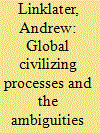

|
|
|
|
|
| Publication |
2010.
|
| Summary/Abstract |
Increased social power over the millennia has led to remarkable achievements in varied spheres of endeavour while introducing new possibilities for more destructive forms of harm over greater distances. Efforts to create moral frameworks to protect persons from senseless harm have been critical replies to the ambiguities of human interconnectedness. Over the millennia, societies have become entangled in global 'civilizing processes' such as the systems of communication that now encompass humanity as a whole, enabling different peoples to become better attuned to each other. Societies of states have immense significance for that long-term development. They have been arenas in which independent communities have discovered the prospects for, as well as the constraints on, agreements on norms that can be anchored in the most readily available points of solidarity between strangers - those vulnerabilities to mental and physical suffering that are shared by human beings everywhere. The recovery of 'universal history from a cosmopolitan point of view' can examine the contribution that international societies have made to global civilizing processes that harness such solidarities to restrain the human capacity to cause violent and non-violent harm to distant peoples. It can support the normative project of promoting global civilizing processes that employ unprecedented levels of collective power to reduce the tragic effects of the ambiguities that have accompanied long-term trends towards higher levels of human interconnectedness.
|
|
|
|
|
|
|
|
|
|
|
|
|
|
|
|
| 2 |
ID:
097731
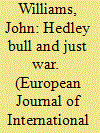

|
|
|
|
|
| Publication |
2010.
|
| Summary/Abstract |
This article explores the reasons for the absence of a systematic engagement with the tradition of Just War in the political theory of Hedley Bull, despite his recognition of war as a key institution of international society and his engagement with normative aspects of International Relations and the thought of Hugo Grotius, a key figure in the Just War tradition. Developing work arguing for Bull's highly problematic reading of Grotius, the article considers the impact of philosophical and methodological aspects of Bull's work to explain his rejection of Just War and to argue that this rejection is neither plausible nor beneficial to Bull's engagement with war as an institution. Additionally, the article considers the potential for and benefits of engagement between English School theory and the Just War tradition for efforts within the English School to more effectively establish its normative dimension.
|
|
|
|
|
|
|
|
|
|
|
|
|
|
|
|
| 3 |
ID:
097736
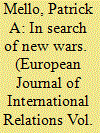

|
|
|
|
|
| Publication |
2010.
|
| Summary/Abstract |
This article examines the literature on 'new wars' as it evolved in Germany, Great Britain and the USA. In order to gain an overview of this heterogeneous field of research five hypotheses are derived concerning characteristics of 'new wars': (1) the erosion of the state's monopoly on the use of force; (2) the political economy of 'new wars'; (3) 'new wars' as asymmetric wars; (4) 'new wars' as identity-based wars; and (5) terrorism within the framework of 'new wars'. The concluding section addresses critiques, provides a brief summary and proposes future research.
|
|
|
|
|
|
|
|
|
|
|
|
|
|
|
|
| 4 |
ID:
097732


|
|
|
|
|
| Publication |
2010.
|
| Summary/Abstract |
Emerging powers such as Brazil and Germany increasingly articulate their desire for leadership in global governance. Examples comprise the bids for permanent membership in the UN Security Council and the founding of the G20 at the WTO meeting in Cancùn. Emerging powers, however, often fail to achieve their goals. This article focuses on followership as a core condition for success and failure of emerging power leadership in global governance. I argue that in order to perform successfully, any leadership must be accepted by followers and that followership depends on the credible inclusion of the interests and/or ideas of potential followers into the leadership project. This argument is tested in case studies on Brazil's and Germany's bids for structural power in the UNSC, for directorship in international organizations and for policy positions in the WTO trade negotiations.
|
|
|
|
|
|
|
|
|
|
|
|
|
|
|
|
| 5 |
ID:
097733
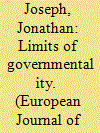

|
|
|
|
|
| Publication |
2010.
|
| Summary/Abstract |
Foucault's concept of governmentality goes beyond the narrow limits of state power to look at how these societies employ more subtle methods of power exercised through a network of institutions, practices, procedures and techniques which act to regulate social conduct. This approach is now gaining influence in International Relations and this piece reflects on this emerging field and tries to steer the debate in a certain direction. It is concerned to explore the limitations of the concept as a social theoretical explanation and also as an account of the international domain. It suggests that because the international domain is highly uneven, governmentality can only usefully be applied to those areas that might be characterized as having an advanced form of liberalism. To explain these limits requires that governmentality be set within a wider theorization of social context.
|
|
|
|
|
|
|
|
|
|
|
|
|
|
|
|
| 6 |
ID:
097734


|
|
|
|
|
| Publication |
2010.
|
| Summary/Abstract |
This article analyses C.A.W. Manning's The Nature of International Society (NIS) by exploring the constructivist insights avant-la-lettre displayed in this not so prominent opus on international society. The article's objective is twofold. First, to re-establish Manning's argument, which has been distorted by its successors. That is to say, whereas often identified as a source of inspiration by subsequent generations of English School academics, the British mainstream at the same time appears to have missed out on Manning's more metatheoretical, socio-linguistic insights. By exploring his message about the link between knowledge, language, meaning and reality, this article secondly addresses the added value of Manning's work in terms of his analysis of the metaphor of sovereignty games. It is argued that, particularly in the analysis of the constitutive role of language, NIS provides useful insights for the reconvention project of the English School.
|
|
|
|
|
|
|
|
|
|
|
|
|
|
|
|
| 7 |
ID:
097735
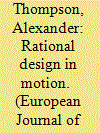

|
|
|
|
|
| Publication |
2010.
|
| Summary/Abstract |
Recent International Relations scholarship offers valuable rational choice explanations for the design of international institutions. However, the rational design literature has relied heavily on institutional outcomes as evidence for testing models. Such studies must be complemented by research designs that analyze the decisions and bargaining that drive design choices in order to expose causal mechanisms and test a wider range of observable implications. I assess an important rational design hypothesis, that uncertainty leads to flexible institutions, by analyzing the negotiations behind the climate change regime and by considering two distinct institutional outcomes across time. While the hypothesis receives considerable support, significant behavior and outcomes do not conform to its logic. I propose refinements for rational design theory in general and work on uncertainty and flexibility in particular. Rational choice theory speaks to the process of institutional design and should not content itself with predicting - and testing itself against - equilibrium outcomes.
|
|
|
|
|
|
|
|
|
|
|
|
|
|
|
|